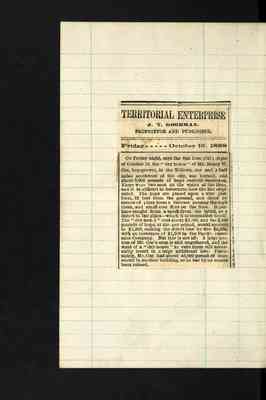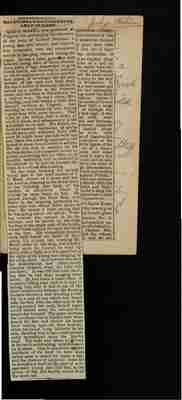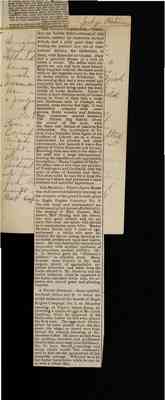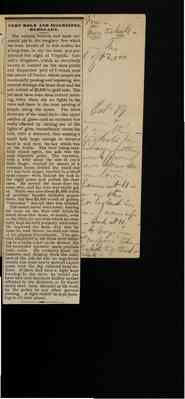Pages
6
TERRITORIAL ENTERPRISE
J. T. GOODMAN.
PROPRIETOR AND PUBLISHER.
Friday . . . October 16, 1868
On Friday night, says the San Jose (Cal.) Argus of October 10, the "dry house" of Mr. Henry W. Coe, hop-grower in the Willows, one and a half miles southwest of the city, was burned, and about 3,000 pounds of hops entirely destroyed. There were two men on the watch at the time, and it is difficult to determine how the fire originated. The hops are placed upon a wire platform, 12 feet from the ground, and dried by means of pipes from a furnace passing through them, and small coal fires on the floor. It perhaps caught from a spark from the latter, or a defect in the pipes--which it is impossible to tell. The "dry-house" cost about $3,000 and the 3,000 pounds of hops, at 45c. per pound, would amount to $1,350, making the direct loss by fire $4,350. with an insurance of $1,500 in the Pacific Insurance Company. But this is not all: A large portion of Mr. Coe's crop is still ungathered, and the want of a "dry-house" to cure them will necessarily result in a large additional loss. Fortunately, Mr. Coe had about 40,000 pound of hops stored in another building, so he has by no means been ruined.
7
MELANCHOLY and UNACCOUNTABLE SUICIDE.
Quite a sensation was produced at Virginia this morning by the discovery of the body of Conrad Dickman, a young man well known and respectably connected, who had committed suicide by hanging himself during the night. He as a quiet, generally behaved young man, of about twenty-three years of age, unmarried, in good robust health, not involved in business or out of employment, and no satisfactory reason is developed for the commission of the rash and fatal deed. He was a native of Germany, formerly served as a soldier in the Prussian army, and has been in this country but a year or two. He has a sister, (Mrs. Demling,) and two brothers, older than himself. residing at Virginia. Last evening he was about the city, having a good time with some friends. They were at the Italian ball a while, on north C street, and subsequently at the Alhambra dance hall. His friends noticed no unusual depression of spirits on his part, and whatever little difficulty he might have got into with any one, there was nothing apparently sufficient to cause him to resort to suicide. We do not care to mention all the various stories and supposed causes reported concerning this sad affair, as all possible testimony will be adduced at the inquest to be held by Coroner Symons at 6 o'clock this evening.
He has been working for several weeks past at the meat market of J. C. Masel, corner of C street and Sutton avenue, sleeping in the lower story of the building just back of the market, or salesroom. About 11 o'clock he came home to bed. He passed through the front shop, and while in the sleeping apartment another man who sleeps there spoke to him. he struck a light, saying that he was going out to the privy. Nothing unusual was noticed in his demeanor, and he passed up the steps leading to the upper part of the house, where doors opened out upon the bank at the rear. His companion went to sleep and heard no more of him. About 5½ o'clock this morning Mr. Masel came to the shop, an inquiry being made for Conrad, he went upstairs with a light, and was appalled at the sight of the young man hanging by the neck, dead. A policeman was sent for immediately, and subsequently Coroner Symons, when the body was cut down. It was stiff and cold, showing that he had been hanging some hours. He had taken a small piece of common baling rope, such as is used in baling hay, tied it fast to one of the short cross-braces between the flooring timbers overhead, and standing probably on a coal oil can which was found near his feet, with the other end of the string around his neck, he had apparently kicked away the can and thus suspended himself. The space between the two floors was so limited that when found, his feet and almost his knees were resting upon the floor beneath, while his hands hung listlessly by his side, showing him to have most persistently determined upon the fearful deed. The body was taken to Wilson & Brown's undertaking establishment on B street. This is one of the saddest incidents of the kind we have been called upon to record for many a day, and the absence of apparent cause for so dreadful a deed on the part of a respectable young man like him, in the prime of life and health, makes it all the more sad.
8
THE ITALIAN CELEBRATION.--Yesterday our Italian fellow-citizens of this section, assisted by numerous invited friends, had a jolly good time celebrating the present new era of their nations' history, the unification of Italy, with Rome for its Capital. they had a splendid dinner at a hall on north C street. The tables were elegantly set out, and were most bountifully supplied with all the heart could wish or the appetite crave in the way of choice eatables or drinkables. In the evening they had a very social and enjoyable ball, as we can personally testify, the band being under the leadership of Louis Jacobson. Across C street, a short distance south of Carson street, in front of their hall, a large and handsome arch of triumph was erected, some twenty feet high. It was beautifully trimmed with evergreens, floral wreaths and festoons, flags, numerous colored lanterns. The Italian flag floated above the center of the arch, with the Stars and Stripes of American on either side. The centerpiece of the arch was a beautiful little figure of the Goddess of Liberty, set in a frame, surrounded by rosettes and other adornments, and beneath it was a fine picture of Victor Emanuel and his son. Reaching from one side to the other of the arch was a large transparency, bearing the significant and appropriate inscription, "Roma Capitale D'Italia." On either side of this were the pictures of Washington and Garibaldi, with the coats of arms of America and Italy. This arch could be seen for a long distance on C street, and represented a most brilliant and beautiful appearance.
THE BENEFIT.--Piper's Opera House was well crowded Saturday evening on the occasion of the grand benefit given to Eagle Engine Company No. 3. The fine vocal and instrumental entertainment given passed off admirably. The singing of Miss Thomas, Mrs. Sauers, Miss Tauzig, and the others, was very good indeed, and we are sorry that time nor space will permit us to particularize more fully. Master Herman Hiller, only 8 years of age, performed a violin solo most admirably for one so young, showing remarkable proficiency upon that instrument. He was deservedly encored and responded with another specimen of his precocious musical abilities. Mr. J. A. Stevens gave his "Fireman's Address" in effective style. Many bouquets were thrown to the lady singers, plenty of appreciative applause bestowed to Mr. Jacobson and the entire audience when he appeared in his finely executed violin solo, the occasion was one of great and pleasing interest.
A FILTHY OUTRAGE.--Some spiteful, low-bred fellow saw fit to insult the entire audience at the benefit of Eagle Engine Company, No. 3, on Saturday evening, at Piper's Opera House, by throwing a couple of eggs at Mr. Louis Jacobson, when he appeared in his violin solo, before he had even played the first note. The eggs were thrown either by some person from the flies above the stage, or tossed over from behind the scenery, breaking at Mr. Jacobson's feet. He never moved from his position, however, and performed his solo with more than usual brilliancy. No. 3's boys, Sheriff Cumminngs and many others would like extremely well to find out the perpetrator of this dastardly outrage. Whoever he is he had better leave town while he can do so with a whole skin.
9
VERY BOLD AND SUCCESSFUL BURGLARY.
The neatest, boldest, and most successful job in the burglary line which has been known of in this section for a long time, to say the least, was perpetrated last night at Virginia. Cornell's drugstore, which, as everybody knows, is located on the most public and frequented part of C street, near the corner of Taylor, where people are continually passing and repassing, was entered through the front door and the safe robbed of $2,000 in gold coin. The job must have been done toward morning, when there are no lights in the store and there is the least passing of people along the street. The front doors are of the usual style--the upper portion of glass--and an entrance was easily effected by cutting one of the lights of glass immediately above the lock, with a diamond, thus making a small hole large enough to thrust a hand in and turn the key which was on the inside. The door being carefully closed again, the safe was the next objective point. The operator, with a drill about the size of one's little finger, worked by means of a common brace, drilled the small slot of a key-hole larger, reached in a bit of stout copper wire, tickled the lock in the right place, and pulled the door open. He served the inner door the same way, and the coin was easily got at. There was also about $1,000 worth of jewelry, besides valuable papers there, but that $2,000 worth of golden "twenties" was all that was wanted.
The smart rascal went away, leaving his tools on the floor with which he bored those two holes so neatly even to the little oil can with which he carefully kept his drill properly lubricated. He departed the same way that he came in, and leaves no card nor trace of his present whereabouts. Two persons employed in the store were sleeping in a room a few yards distant, but the successful operator made precious little noise. He certainly knew his business, and judging from the neatness of the job, he was no sage-brush slouch, but some newly arrived expert come over the big railroad from the East. If there had been a light kept burning in the store, he would not have had such excellent facility as that afforded by the darkness, as he would easily have been detected at his work by the police or any other persons passing. A light should be kept burning in all such places.
10
CONFLAGRATION AT VIRGINIA!
Nine Buildings Destroyed
LOSS . . . $40,000
About half-past one o'clock yesterday morning a fire broke out in the rear basement of the Washoe stable on south C street, Virginia, and in half an hour all the adjoining buildings, which were all of wood, on that side of the street, between Johnson's brick furniture store and the old Heilshorn stable, at the corner of the cross street leading down to the Gould & Curry office, were in ashes. The fire burned through to D street, but was checked in its course northward by the strenuous exertions of the firemen, aided by the above mentioned brick building, occupied by Johnson. Another fortunate circumstance consisted in the fall of snow the evening before, covering all the roofs with half an inch or so of that dampening, fleecy protection. A tolerably strong wind from the westward assisted the firemen very materially in preventing the fire from crossing to the west side of C street. If it had got across, the destruction would have been far more extensive, in fact it is difficult to tell where the conflagration would have stopped, owing to the large number of wooden buildings andthe scarcity of water. The alarm was started by the Gould & Curry whistle, and in a few moments it became general. Considering the hour, when everybody was sound asleep, the fire department got to work in very short time indeed. It was an extremely lively fire, and spread so rapidly that very little in the shape of furniture was saved, occupants escaping with whatever they could get away with the easiest,many escaping barefooted and half clothed, and not even saving their valuables. The hose belonging to the Gourld & Curry hoisting works, with D. J. ahoney as pipeman, was the virst brought into service and was very efficient in preventing the fire from communicating to the works, as well as saving several small cottages near by. But for their steady, well directed stream, aided by the other streams directed upon that point, from C street, the fire would have swept entirely through the city. Of the Fire Department, Young America Engine Company, No. 2, got "first water," and very judiciously played first upon the houses on the west side of C street, the fronts of which were already smoking. In fact, those fronts to-day, blackened and scorched by the fierce heat, show conslusively that the Young America boys saved that side of the street. Washoe Engine CDompany, No. 4, took water at the cistern opposite Smith street, and very materially assisted in stopping the progress of the fire past Johnson's store. No. 6, from the Divide, was on hand, so were all the other machines of the Department. No. 5's boys, with their lively new machine, the Eureka, stationed themselves at the cistern opposite the Virginia House, and stayed there, although the heat was terrible. They played upon the fire and also upon the buildings in danger, doing most effective and praiseworthy service. They were perfect heroes, and never left that cistern till they pumped it dry, when they moved to a cistern further south.
Losses.
The following are the losses, ascertained or estimated, southward along C street from Johnson's furniture store: Two frame buildings, owned by G. G. Briggs, of Oakland, Cal., worth $1,500. The occupants, Killeen and family, Dr. anson, office; Miss Dowd, dressmaker and emplooyment office; a Chinese doctor and a Chinese wash-house; lost in the way of furniture, etc., perhaps $1,000. E. W. Keyes, furniture and undertaking establishmennt; loss probably covered by ten thousand dollars insurance. Delaney's building, occupied by Wilber & Andrews's furniture and undertaking establishment, loss $8,000--nothing saved. Birginia House, owned by Mr. Solovan, of San Francisco, and occupied by S. A. Tompkins, $13,000--house, $5,000 and Tompkins' loss in furniture, etc., $8,000, very little being saved. Building south of the Virginia House, owned by Stewart & Gagnon, of Oakland, Cal., and occupied by Dr. Hop Lock and Chinese washmen, $1,000. Two residences on D street, owned and occupied by James Moore and Jerry Sullivan, $4,000. The basemenet of the Washoe stable was used as a pig pen by a Mr. Connelly; all these unfortunate porkers were roasted alive.
Insurance.
The following constitute the items of insurance: E. W. Keyes, $10,000; Wilber & Andrews, $1,200; Birginia House--Solovan, $1,000; Tompkins, $2,000.
Incidentals.
About the only valuables saved from Keyes' was the large embroidery picture of Washington recently raffled at a religious fair, and Keyes' fine hearse. Dr. Fowler, boarding at the Virginia House had to get out in such a hurry that he left $500 in gold coin, which went down with the house. Several of the other boarders and lodgers had to leave in similar haste, saving scarcely anything but what they stood in. Charley Goodwin, of Young America No. 2, came near being roasted alive. While cutting a hole to get a stream under the sidewalk near the Virginia House, the sidewalk gave way and he fell directly into the fire. He caught hold of a burning timber, and was saved by Ben Lackey and others, who at the peril of their own lives dragged him out almost by the hair of his head. His escape was as miraculous as that of Martin Wylie. Just as the Virginia House fell, young Wylie, who with others had been assisting to save valuables from the burning house, was coming out of the front parlor window. The building gave way and went down the bank with a loud crash, carrying Wylie with it amid flame and burning lumber. The boy rose to his feet, waved his hat, and shouted "play a stream on me~" The pipeman of Eureka engine did so, the flames were deadened and willing hands assisted Wylie out of his fiery tomb.
Incendiary.
This fire was doubtless the work of an incendiary, as the stable where it originated was unoccupied, except as a pig-pen beneath. The squealing of the poor porkers, as they roasted alive, was fearful and piteous. It is a great pith that the infernal perpetrator of this great crime, whereby so much valuable property was destroyed, had not been roasted alive also in the pen with the pigs.
Fighting.
In the morning, after the fire was over, too much bad whisky induced some of the company boys to get into numerous fights. The consequence was several arrests. Those boys won't do, and we are glad to learn that Chief Downey is about to attend to them. Officer Higbee got
Shot in the Leg
While taking one of them to the station-house. The ball entered the calf of the left leg, and was taken out near the heel.






